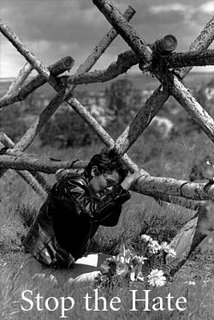Short in stature, Judy Shepard walks in and stands at a podium in Chicago, only to be dwarfed by an unwieldy microphone. ''I'm not a professional speaker,'' she tells her audience. They number in the hundreds and are mostly teens and young adults.
She is, she tells them, ''a mom with a story.'' She's a social studies teacher, a country girl from Wyoming who reluctantly became a political activist after her 21-year-old son Matthew Shepard was beaten, tied to a fence, and left for dead on the prairie outside Laramie, Wyo., in 1998.
She is, she tells them, ''a mom with a story.'' She's a social studies teacher, a country girl from Wyoming who reluctantly became a political activist after her 21-year-old son Matthew Shepard was beaten, tied to a fence, and left for dead on the prairie outside Laramie, Wyo., in 1998.

A mourner grieves at the fence where Matthew Shepard was tortured
Because Matthew was gay, his high-profile death eight years ago became a rallying point for proponents of tougher hate crimes legislation. Since then, Shepard has hounded politicians, asking them to broaden hate crimes protections on the federal level and in many states that don't have them, including her own. She has stood side-by-side with the family of James Byrd Jr., a black man who was dragged to his death in Jasper, Texas, the same year Matthew died. ( Keep Reading)
No comments:
Post a Comment